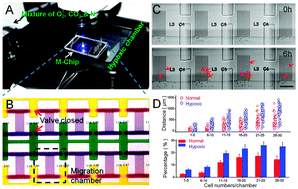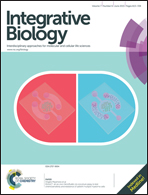Utilizing a high-throughput microfluidic platform to study hypoxia-driven mesenchymal-mode cell migration†
Abstract
Hypoxia is a critical microenvironment in tumor pathogenesis. There is a close relationship between hypoxia, tumor metastasis and poor prognosis. Hypoxia has been shown to induce epithelial–mesenchymal transition and high levels of lactic acid production, through which cancer cells gain migratory capability. Here, we present a high-throughput microfluidic platform with a controlled oxygen environment to specifically monitor mesenchymal migration under hypoxic conditions. We found that, combined with a slightly alkaline microenvironment, such a platform can help to improve the efficiency of antimetastatic drugs. We also use this platform to study primary and rare cells from mice and demonstrate the correlation between on-chip results and in vivo outcome. This device may provide a new opportunity for biologists and clinicians to better perform assays that evaluate cancer cell behaviors related to metastasis.


 Please wait while we load your content...
Please wait while we load your content...